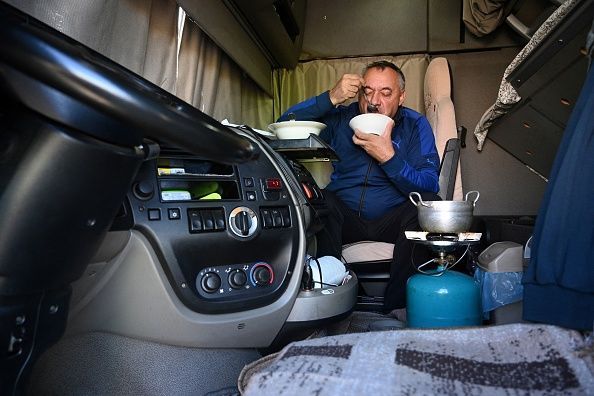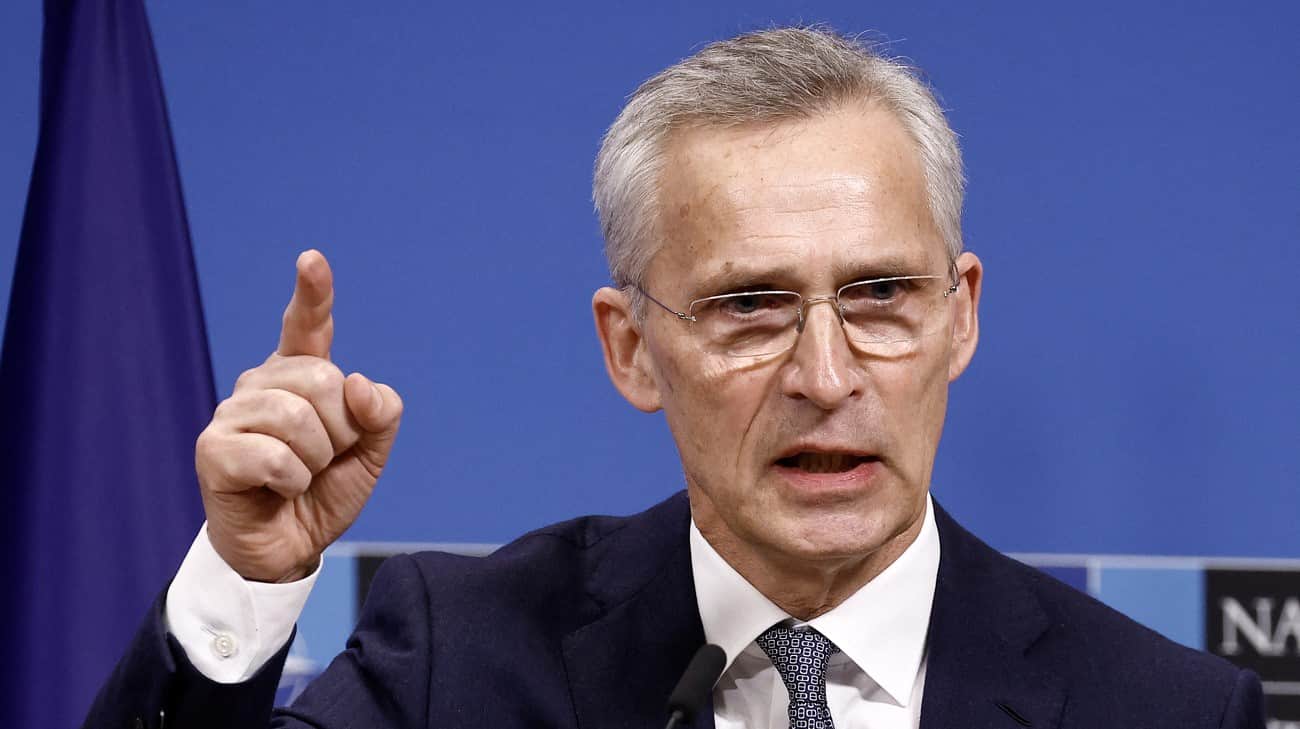Border blockade by Polish drivers “damaging for all,” Ukrainians say
Queues with waiting times over 150 hours formed due to blockades by Polish carriers won't solve issues between two major markets. "It’s a question of arrangements between Ukraine and the EU," head of the Polish Department at Central Europe's Institute, Jakub Olchowski, said. The post Border blockade by Polish drivers “damaging for all,” Ukrainians say appeared first on Euromaidan Press.

Polish trucking companies have argued for months that Ukraine’s special temporary access to EU roads, signed in June 2022, is undercutting their business. However, the current protest of the Polish carriers at the Polish-Ukrainian border crossing, which started on 6 November, is causing far more economic challenges for Ukraine and its partners.
As of 9 November, a queue of Ukrainian trucks nearly 30 kilometers long formed at the Medyka-Shehyni border crossing, the only transit point not entirely blocked by Polish truckers, Radio Liberty reported, citing a spokesman for the Beszczadzki Border Guard. About 1,020 trucks were lined up on the Ukrainian side, waiting to cross into Poland, with an estimated wait time of 55 hours.
The protest, planned for two months, aims to push back against increased competition from Ukrainian hauliers after the liberalization of Ukraine-EU transport laws. This is not only a blow to Ukraine, whose Black Sea exports were cut short by a Russian blockade, but to Poland as well, experts tell Euromaidan Press.
The protests on the Polish-Ukrainian border crossing are detrimental to both sides
Dmytro Shulga, the Program Director of the International Renaissance Foundation, said that as far as he knows, “none of the Polish business associations have lobbied for the decision to start protesting.”
“There is a difference in business interests, because there are farmers who grow seeds for their competitors, and there are those who grow corn. They need fresh grains, and the lower the price, the better. For consumers, in fact, the lower the price of bread, the better. But for the farmers, who grow the grain, it is not bad,” he added.
Moreover, it’s more convenient for Polish businesses to rent a Ukrainian carrier that would transit products.
“It turned out that it was easier for us to pay for a Ukrainian carrier in Ukraine than for them to pay for transit in Poland. There are fewer people who would agree to go to Kharkiv, the city which is being bombed by Russians,” Shulga added.
Another misunderstood problem is that Ukrainian businesses create competition. However, it’s not correct to say so, said Anna Liubyma, head of the International Department in the Ukrainian Chamber of Commerce and Industry. “We don’t have Polish passports,” Liubyma said (bearing in mind that the passport of a Polish citizen gives much more rights to entrepreneurs in Poland.)
Liubyma said that two or three months ago, she, together with different Ukrainian business associations and also with Polish associations and business entities, talked about a pilot project to open a joint cross-border point. She explained that such an initiative would be important for fostering international trade and economic growth.
“Nowadays, just from the 6th of November, our three cross-border points have been blocked, and we are trying to solve this issue from our side, as a business community,” Liubyma said.
She explained that for Ukrainian investors who have relocated their businesses and created jobs in these countries, it’s natural that Ukrainian companies would connect with established companies in other countries, which brings mutually beneficial conditions. Ukrainian companies can also utilize investment instruments available in those countries, she said.
“So that means additional tax revenue contributed to the budgets of those countries by the Ukrainian companies,” Liubyma said.
She said that Ukraine and Poland have to find more ways to take advantage of the mutually beneficial Ukrainian-Polish cooperation in business, as Ukraine cannot decline permission for the transit of Ukrainian export products. “That is a decision of the European Union.”
Moreover, Liubyma added that Ukraine is on the way to becoming part of the EU. Thus, in the future, it highly likely will be a single market encompassing Ukraine.
“That is an effort that we have already made. And we are moving towards European Union integration. It is not possible to just refuse or decline these possibilities. We should talk about joint ventures, about subcontracting,” Liubyma highlighted.
Ukrainian refugees, who are now helping to fill labor shortages, are another benefit for the EU market. However, this is a problem for Ukraine, because it needs Ukrainians to return. But for now, it is beneficial for Europeans, she added.
Ukraine doesn’t have enough market to consume all the products
The Russian invasion of February 2022 and the resulting all-out war have distorted and harmed Ukrainian exports and hurt the economy, meaning Ukraine has less ability to consume imports.
In the first eight months of this year, Ukrainian exports were down 15% from the same period last year and down 41% from 2021 (the year before the all-out invasion), according to the head of the International Department in the Ukrainian Chamber of Commerce and Industry. Before Russia’s full-scale invasion of Ukraine, Ukraine’s main trading partner was China. Today, Poland and Romania are Ukraine’s top two trading partners. In the first eight months of 2023, Ukraine’s exports amounted to $25 billion.
Before the war started, Ukraine was responsible for half of the world’s sunflower oil supply. Liubyma said that this is not only an issue for the Ukrainian economy; it also reduces tax revenues for the Ukrainian budget. She added that the reduction also affects Ukraine’s role as a contributor to global food security.
In addition, Ukraine’s harvest has only increased this year. Its agricultural companies need to sell these products somewhere.
“Despite a great number of difficulties, including the mobilization (into the Army) of Ukrainian tractor drivers from the world’s most fertile farmland, Ukraine’s harvest in 2023 increased compared to 2022. Thus, the issue is how to export the huge amount of grain products,” said Liubyma.
Problems with logistics are hurting Ukrainian exports as well.
“Before the all-out war, we had 18 seaports, which were responsible for 70% of all our deliveries, and 90% for agriculture product exports. Now we only have two ways to deliver and export our products – by railway and cargo trucks,” Liubyma said.
Railway tracks do not allow us to export quickly by rail. At the beginning of the war, we had 40 railcars lying idle near the border, she said.
“If you talk about cargo trucks, that is an additional complicated issue, and I think everyone can understand that it is not a good idea for drivers to be stuck waiting in line at the border for a month,” the head of the International Department in the Ukrainian Chamber of Commerce and Industry explained.

At the Hrebenne-Rava Ruska crossing, Polish border guards reported around 450 trucks waiting, with an estimated queue time of 155 hours — over six days.
Ukrainian driver Ihor Klak, who has spent two days in line in front of the Hrebenne checkpoint, said that Polish carriers did not keep their promises and did not let even one car through per hour, saying, “I haven’t moved a single meter in the last five hours.” He added that this was disastrous for the business.

Jakub Olchowski, head of the Department of the Institute of Central Europe, said at the third Ukrainian Central Eastern Forum in Lviv on 7-8 November that he didn’t know “who was right on the Ukrainian-Polish transportation argument.”
“I think these Polish protesters don’t understand precisely that it’s not a question of any decisions of the Ukrainian government or the Polish government. It’s a question of arrangements between Ukraine and the EU, not between Ukraine and Poland,” Olchowski told at the forum.
However, according to Olchowski, Ukrainians themselves cannot decline permission for Ukrainian products’ transit to the EU countries, as it is the decision of the EU. The Ministry of Infrastructure of Ukraine has scheduled talks at the border with representatives of the Polish authorities and Polish carriers on 13 November. The State Border Guard Service of Ukraine hopes it would allow it to resume normal traffic through the checkpoints between the two countries, Radio Liberty reported.
Context
The major protest by Polish truck drivers threatened to shut down all border crossings between Poland and Ukraine starting on 3 November, Ukravtoprom reported.
The strike was planned to last two months and aimed to draw the Polish authorities’ attention to the country’s transport industry. In particular, to push back against increased competition from Ukrainian hauliers after the liberalization of laws governing international transport between Ukraine and the EU.
According to the statement, the protest was agreed upon with the local authorities. If earlier job actions targeted only one border crossing, this time, “they plan to block all available entries from Ukraine,” the International Transport Association of Ukraine said.
Polish carriers demand Ukraine reintroduce permits for transportation that were canceled under the transport visa-free regime. This agreement on road freight transport signed in June 2022 eliminated the need for Ukrainian carriers to obtain permits for bilateral and transit transportation to EU states.
After the signing of the agreement, the number of carriers crossing the border towards the EU increased by 53% in the first year, and the number of crossings increased by 43%.
The Polish carrier’s plan also demanded toughening of ECMT (European Conference of Transport Ministers) transportation rules for foreign carriers; the inability to register companies in Poland if the company’s finances are not in the EU, etc.
Read more about how Ukraine and Poland could resolve their differences in our article: Grain dispute: how Poland and Ukraine can reach a solution
Related:
- Polish carriers block three border crossings with Ukraine
- Ukraine’s key Black Sea ports resume grain shipments despite Russian threats
The post Border blockade by Polish drivers “damaging for all,” Ukrainians say appeared first on Euromaidan Press.



